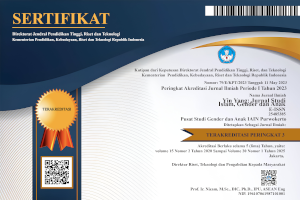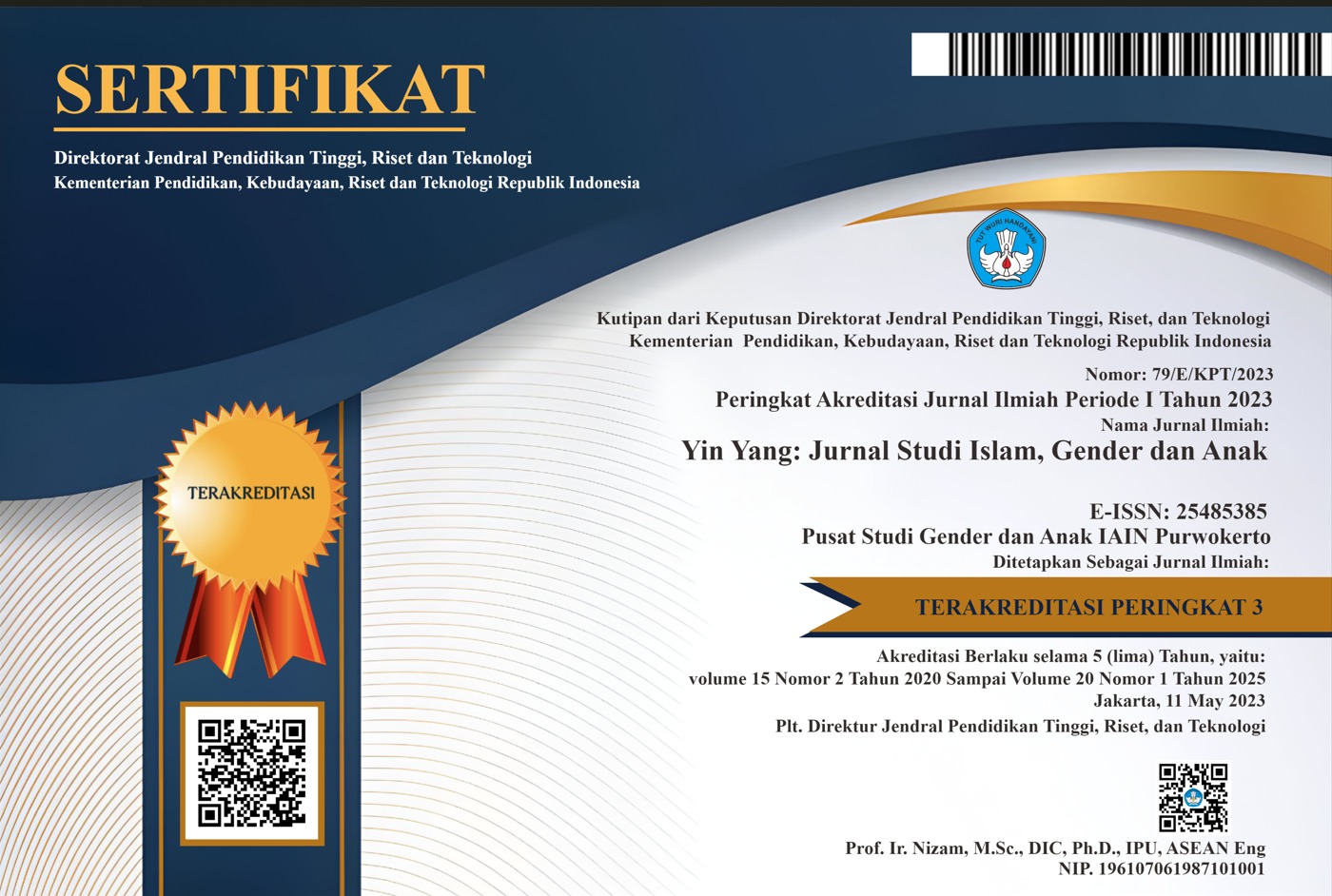Authority of a Female Cleric in the Educational Sphere (A Study of Nyai Khairiyah Hasyim’s Leadership)
DOI:
https://doi.org/10.24090/yinyang.v19i1.9398Kata Kunci:
Authority, Nyai Khairiyah, Leadership, EducationAbstrak
This research project aims to explore the relationship between piety, initiative, and the process of self-empowerment in a female cleric, drawing on Saba Mahmood’s theory of piety. The empirical evidence is based on ethnographic research into the transformation of Nyai Khairiyah Hasyim’s religious authority. This article presents two key propositions. First, it analyzes the transformation of Nyai Khairiyah Hasyim, who promoted Islamic boarding school education and became the first female school instructor in the city of Makkah. Second, it examines how her contributions and fatwas have brought about significant shifts in the perception of women in public spaces within a maledominated society. By reflecting on her personal experiences and efforts as a woman and cleric rooted in Islamic boarding school traditions, she has demonstrated a depth of knowledge and insight that challenges the notion of formal diplomas. Her fatwa products include allowing female students to wear hijabs during marching activities, innovating the rubu’ hijab model, and advocating for the family planning (KB) program.Unduhan
Referensi
Burhanudin, J. (2002). Ulama Perempuan Indonesia. Gramedia Pustaka Utama.
Doyle, P. J. (1994). The Theory of Social and Economic Organization. Oxford University Press.
Hsb, S. H., & Hambali, R. Y. A. (2023). Kesetaraan Gender dalam Pendidikan Islam di Indonesia (Perspektif Nyai Siti Walidah dan Nyai Khairiyah Hasyim). Gunung Djati Conference Series, 19, 779–794. https://conferences.uinsgd.ac.id/index.php/gdcs/article/view/1559
Huda, M. A., Khoiri, M., & Anwar, N. (2021). Dinamika Pendidikan Di Pesantren Tebuireng Dan Pengaruhnya Terhadap Masyarakat Jombang 1948-1975 M. Jurnal Tamaddun, 9(2).
Husein, M. (2020). Perempuan Ulama di Atas Panggung Sejarah. IRCiSoD.
Liriwati, F. Y., & Anwar, S. (2022). Menelisik Peran Pesantren dalam Regenerasi Ulama Perempuan. Al-Aulia: Jurnal Pendidikan Dan Ilmu-Ilmu Keislaman, 8(2), 108–115. https://doi.org/10.46963/aulia.v8i2.752
Misrawi, Z. (2010). Hadratussyaikh Hasyim Asy'ari Moderasi, Keumatan dan Kebangsaan. Kompas.
Mu'ammar, M. A., & Wahid Hasan, A. (2017). Studi Islam Kontemporer: Perspektif Insider/Outsider. IRCiSoD.
Mulia, M. (2021). Muslimah Reformis For Mileneal. PT. Gramedia.
Muzayanah, F. (2020). Gerakan Sosio-Intelektual Nyai Khoiriyah Hasyim. The International Journal of Pegon : Islam Nusantara Civilization, 4(02), Article 02. https://doi.org/10.51925/inc.v4i02.34
Pranidhi, D., Santoso, W. M., & Siscawati, M. (2022). Otoritas Perempuan Dan Religiusitas Gayatri Rajapatni. Dharmasmrti: Jurnal Ilmu Agama Dan Kebudayaan, 22(1), Article 1. https://doi.org/10.32795/ds.v22i1.2748
Rofiq, A. (1998). Hukum Islam Di Indonesia. PT. Raja Grafindo Persada.
Samsu, S., Kustati, M., Perrodin, D. D., & Suwendi, S. (2021). Community Empowerment in Leading Pesantren: A Research of Nyai's Leadership. International Journal of Evaluation and Research in Education, 10(4), 1237–1244.
Srimulyani, E. (2012). Women from Traditional Islamic Educational Institutions in Indonesia: Negotiating Public Spaces. Amsterdam University Press. https://www.jstor.org/stable/j.ctt46n2fm
Ulum, A. (2021). Nyai Khairiyah Hasyim Asy'ari (2nd ed.). CV. Global Press.
Zainu'ddin, A. (1970). Education in the Netherlands East Indies and the republic of Indonesia. Melbourne Studies in Education, 12(1), 17–82. https://doi.org/10.1080/17508487009556022
Zamakhsyari Dhofier, Tradisi Pesantren, Studi tentang Pandangan Hidup Kyai—Persee. (n.d.). Retrieved 28 June 2023, from https://www.persee.fr/doc/arch_0044-8613_1984_num_28_1_1939
Unduhan
Diterbitkan
Cara Mengutip
Terbitan
Bagian
Lisensi
Hak Cipta (c) 2024 Imas Nur Kholida

Artikel ini berlisensiCreative Commons Attribution-ShareAlike 4.0 International License.
Authors who publish with this journal agree to the following terms: Authors retain copyright and grant the journal right of first publication with the work simultaneously licensed under a Creative Commons Attribution-ShareAlike 4.0 International License that allows others to share the work with an acknowledgment of the work's authorship and initial publication in this journal.

















